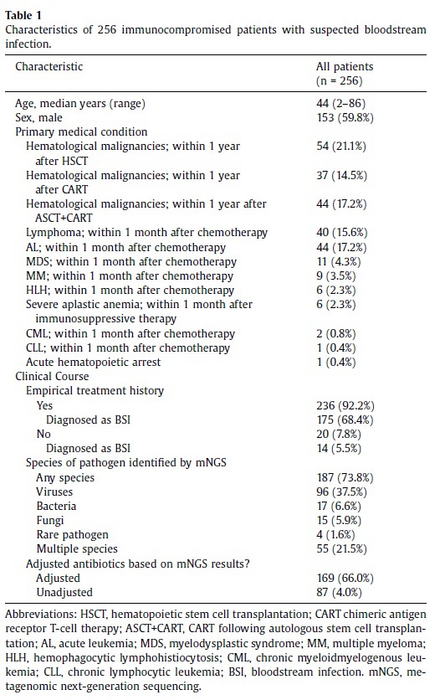The research published in the Journal of Infection investigated the use of metagenomic next-generation sequencing (mNGS) in diagnosing bloodstream infections (BSIs) for immunocompromised hematology patients. Hematology patients are highly susceptible to BSIs, which can have severe consequences such as septic shock, multiple-organ failure, disseminated intravascular coagulation, and even death. An accurate and quick microbiological diagnosis of BSI is therefore essential for the control of the infection.

Characteristics of 256 immunocompromised patients with suspected bloodstream infections view more
Image Credit: BGI Genomics
In the study, conducted between January 2019 and December 2020 at Tongji Hospital with the participation of BGI Genomics researcher Wenqian Zhang, peripheral blood samples were collected from 256 immunocompromised hematology patients suspected of BSI, and both mNGS and conventional microbiological tests (CMTs) were performed. BSI diagnosis was confirmed in 189 out of 256 patients (73.8%). The detection rate of mNGS was significantly higher than that of CMTs, with mNGS identifying 187 infection cases and CMTs identifying 81. Results indicate mNGS outperformed CMT in detecting bloodstream infections.
Bacteria were detected in 17 patients (6.6%), fungi in 15 patients (5.9%), rare pathogens in 4 patients (1.6%), and multiple species in 55 patients (21.5%).
Based on mNGS results, viral infection was the most frequent BSI, identified in 96 out of 256 patients (37.5%). The five most common causative viruses were CMV (31.3%), EBV (14.8%), HSV1 (11.7%), BK virus (11.7%) and HHV6B (9.4%).
The results also showed that it was more likely for patients who had undergone hematopoietic stem cell transplantation (HSCT), than those who had not, to be infected by BK virus and HHV6B.
Overall, the study highlights the potential of mNGS as a powerful tool for the rapid and accurate diagnosis of BSIs in immunocompromised hematology patients, allowing for timely and effective treatment.
About BGI Genomics
BGI Genomics, headquartered in Shenzhen China, is the world's leading integrated solutions provider of precision medicine. Our services cover over 100 countries and regions, involving more than 2,300 medical institutions. In July 2017, as a subsidiary of BGI Group, BGI Genomics (300676.SZ) was officially listed on the Shenzhen Stock Exchange.